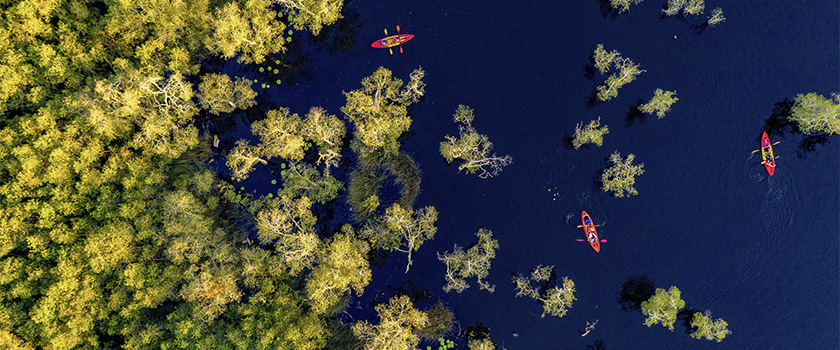We explore the importance of nature in our economies and societies – the concept of 'nature-positive', and how businesses can contribute to this global societal goal – in our interview with Dr Noëlle Kümpel, Senior Advisor at BirdLife International.
BirdLife International is the world’s oldest and largest partnership for nature, with national NGO partners in 120 countries around the world, all sharing a common vision: to mobilise lasting, sustainable protection for the world’s birds, their habitats, and global biodiversity in general. BirdLife is one of the founding partners of the Cambridge Conservation Initiative (CCI).
The voice of CCI on UBP’s Biodiversity Committee – like those of its other member organisations – is integral to the Committee’s corporate engagement on nature and biodiversity.
UBP’s Impact team: Why should we care about nature?
Noëlle Kümpel: Nature underpins economies and societies, and over half of global GDP is dependent on it. However, for too long nature has been treated as an externality or a cost to business, rather than an opportunity to enhance sustainability, acceptability and, ultimately, profitability. The case for nature is, however, now irrefutable: for example, the World Economic Forum’s Future of Nature and Business report estimates that nature-positive transitions could generate USD 10 trillion in annual business opportunities.
How do we capitalise on these opportunities?
To change both this mindset and the trajectory of biodiversity decline, we need to embed nature-related risk, dependency and opportunity throughout government and corporate policy and practice. This needs system-wide thinking and transformative leadership to move us from voluntary, well-intentioned but necessarily restricted efforts to a collective, regulated approach, raising standards, reducing costs and barriers for all, and minimising the risk of falling short, freeloading, or greenwashing.
What does “nature-positive” mean and where does it come in?
As defined by the multi-stakeholder Nature Positive Initiative, “nature-positive” is a global societal goal aiming to halt and reverse nature loss by 2030 compared with 2020, and to achieve full recovery by 2050, through measurable net-positive biodiversity outcomes. Increasing government and, in particular, business and finance commitments, reflect the urgency of, and agreement on, the need for the need to become nature-positive, most notably in the Kunming-Montreal Global Biodiversity Framework (GBF)'s mission to halt and reverse biodiversity loss by 2030.
How can we meet the global nature-positive goal?
Transformational change is needed to deliver a nature-positive and net-zero world by 2050, and while the pathway (if not progress) to net-zero carbon emissions is relatively clear through the compilation of nationally determined contributions, we have no comparable quantitative “stocktake” to track progress towards nature positive. To achieve the global nature-positive goal, we need:
- A clear framework to map out a route to nature positive globally, including tools and metrics to understand contributions and track the progress of different actors at different scales;
- Testing of approaches and the scaling up of those that work;
- Joint advocacy for the policy reform and government oversight to support/ regulate the proliferation of private sector efforts.
Can a business be “nature-positive”?
Nature positive has been conceived as a global societal goal, which requires change not just in terms of individual companies, but also in terms of the economic, social, and political systems within which companies are embedded. On this basis, an individual company cannot claim to be nature-positive but can contribute to the global nature-positive goal by systematically abating its ongoing and future pressures (to halt future declines), making proportional positive contributions to nature recovery, and driving systemic change. Companies and development projects should therefore commit to demonstrably delivering biodiversity net gains aligned with the timeframe of the nature-positive goal.
Multistakeholder collaboration is critical. To help deliver the nature-positive goal, there is a critical need for more investment in data collection, collation and management, and associated decision-making tools, through co-creation and collaboration between governments, investors, companies, scientists and conservation practitioners. The finance sector can play a key role in helping to drive change (as envisaged by initiatives, such as the Taskforce for Nature-related Financial Disclosures), but work is needed to understand the real-world barriers to progress and practical challenges for companies in which they invest.
As part of the Cambridge Conservation Initiative (as introduced in last year’s Impact Report), we are excited to be working with UBP to identify challenges to nature-positive investment, such as limited corporate disclosure of the necessary location-specific data relating to both company activities and biodiversity, and difficulties in tracking biodiversity in real time and at the scale necessary for company reporting. This will be critical in understanding how we can adapt and further develop tools designed to support nature-positive investments like the Integrated Biodiversity Assessment Tool (IBAT) and related metrics such as the Species Threat Abatement and Restoration (STAR) metric, as well as how we can work together to identify the regulations, safeguards, standards, finance and high-integrity accounting needed to move away from business-as-usual and to ensure the finance sector as a whole is ahead rather than behind the curve of biodiversity loss.
Dr Noëlle Kümpel, Senior Policy Advisor at BirdLife International
Noëlle is Senior Policy Advisor at BirdLife International, the world’s oldest and largest partnership for nature, with national NGO partners in 120 countries around the world. She has over 25 years’ experience in applied conservation, research, project management and policy, including five years in the field in Africa and Asia. Now specialising in advocating for stronger nature and climate policy and implementation through international conventions and other global policy mechanisms, her wide range of expertise includes extensive engagement with and giving advice to the finance and business sectors. She currently sits on the UK government’s Darwin Expert Committee and previously sat on its Illegal Wildlife Trade Advisory Group, co-chaired the IUCN SSC Giraffe and Okapi Specialist Group, and chaired the UK Bushmeat Working Group.








